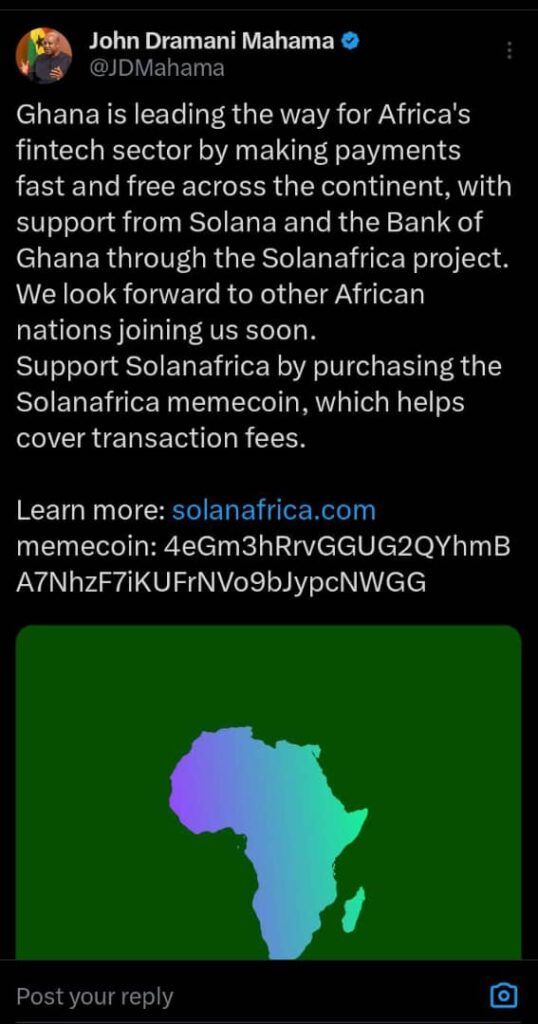CybAfriqué is a space for news and analysis on cyber, data, and information security on the African continent.
Hi everyone,
We missed publication last week due to medical absence. Grateful to everyone who’s reached out to check up. As a way to make it up, we’ve included most of the key highlights we’d prepared against last weeks publication, including an highlight looking at gender bias in the digital divide, prepared in commemoration of the International Women’s day.
Enjoy!
— Olatunji
HIGHLIGHTS
Ghana’s President’s X account breached
Ghanaian President John Mahama’s official X account, boasting 2.4 million followers, was compromised between March 15–17, 2025, in a brazen cryptocurrency scam. Hackers posted a video of Mahama’s February 1 speech at the Africa Prosperity Dialogue, misleadingly captioned to endorse Solana, a blockchain platform. A follow-up post on March 17 pushed a fictitious “Solana Crypto Fund,” falsely claiming it would underpin Africa’s fintech systems. The posts amassed over 216,000 views and were amplified by local and international media, including state-owned Daily Graphic, before the breach was confirmed.
The hackers leveraged a fabricated initiative, “SolanAfrica,” which cited Mahama as its leader and listed deceased Deputy Finance Minister John Kumah among its team. Investigations by GhanaFact revealed the domain solanafrica.com was registered in Los Angeles and falsely implicated the Bank of Ghana. Despite swift deletion of some posts, screenshots circulated widely, fueling speculation about Mahama’s alleged crypto pivot.
Government officials remained silent for 48 hours until Presidential Spokesperson Felix Kwakye Ofosu acknowledged the breach on March 17. Ghana’s Cyber Security Authority (CSA) later confirmed recovery efforts, stating collaboration with X’s support team. Mahama regained control by March 18, tweeting: “My team has restored my account… Thank you for enquiries.”
State-linked Daily Graphic’s X account also circulated pro-crypto content amid the incident, raising concerns about coordinated attacks. While outlets like Asaase Radio retracted stories, crypto platforms like Binance amplified the false narrative, illustrating how fraudsters exploit trusted institutions.
Kenya fines loan app
Kenya’s data watchdog, the Office of the Data Protection Commissioner (ODPC), fined a loan app called Whitepath $2,000 (KES 250,000) for two key violations:
Illegally Adding a Guarantor: The app listed someone as a loan guarantor without his permission.
After the borrower defaulted, Whitepath bombarded the guarantor with repeated calls demanding repayment, even though he had no connection to the loan.
The proliferation of unregulated digital lending platforms in Africa has exposed systemic vulnerabilities in data privacy frameworks, with predatory apps weaponizing personal information to enforce loan repayment. In Kenya, where over 100 unregulated lending apps operate, borrowers—often excluded from formal banking due to lack of collateral or business credentials—face draconian tactics. Threats such as “I will send your names to all your contacts and destroy you” underscore a disturbing trend: lenders exploiting Kenya’s 89% mobile penetration rate to harvest contact lists, location data, and social media activity, weaponizing this information to shame or intimidate defaulters.
Kenya’s regulatory response, while progressive, reveals gaps in enforcement. Whitepath, a repeat offender, was fined a mere $2,000 (KES 250,000) in 2024 for adding a guarantor without consent—a penalty critics argue is insufficient given the firm’s prior $39,000 fine in 2023 for harvesting 1,500 users’ contact lists. The Data Protection Act (2019) mandates consent for data sharing, yet weak enforcement allows firms to flout rules. A 2023 report by Privacy International found that 72% of Kenyan loan apps access device permissions unrelated to creditworthiness, such as SMS and call logs, enabling blackmail. Similarly, Nigeria’s 2021 crackdown on Soko Lending (fined $24,000 for defamation campaigns) highlights a regional crisis. Despite Nigeria’s 2023 Data Protection Act, which criminalizes unauthorized data use, a 2024 Surfshark study ranked Nigeria and Kenya among the top 10 African nations for data breaches linked to fintech.
A 2023 FSD survey found that 68% of Kenyan borrowers prioritize loan apps due to urgency, despite average annual interest rates of 365%. This desperation creates a perverse incentive for platforms to monetize privacy violations. While regulators in both countries have suspended hundreds of unlicensed apps since 2022, the lack of harmonized pan-African data laws enables operators to rebrand or pivot jurisdictions. Experts argue that punitive fines must scale with corporate revenue, and legislation should mandate algorithmic transparency to curb discriminatory lending—a concern raised by the UN Special Rapporteur on Privacy in 2023.
Gender inequities in the digital divide
In Northern Nigeria, 60% of women lack internet access—a disparity rooted in cultural restrictions, as 55% of husbands actively block wives’ online activity, per a 2020 study. This contrasts sharply with urban centers like Lagos, where 42% of women use the internet, though still lagging behind men (54%). USAID data (2023) shows Nigerian women’s labor force participation drops 18% in low-connectivity areas, exacerbating poverty cycles.
The exclusion begins early. Only 1.37% of adolescent girls in Northern Nigeria own phones, compared to 77% of boys—a disparity perpetuated by fears of “moral corruption.” Fathers, citing religious conservatism, restrict daughters’ access to prevent exposure to “un-Islamic” content, as noted in CITAD’s interviews with 2,000 families. This institutionalized bias has macroeconomic costs: the World Bank estimates Nigeria loses $32 billion annually in GDP due to gender gaps in employment and productivity.
Grassroots initiatives like the Samira Buhari Mentorship Programme (SBMP) aim to counterbalance structural barriers by training 5,000 women in digital skills. However, such efforts face systemic hurdles. Northern states allocate only 4% of education budgets to STEM programs for girls, and 78% of rural women lack access to grid electricity, per the National Bureau of Statistics (2023). Comparatively, Rwanda’s Gender and ICT Policy (2022)—mandating equal broadband access—has narrowed its gender internet gap to 8%, suggesting Nigeria’s federal approach needs decentralization to address regional patriarchies.
The digital divide also reflects geopolitical inequities. While 72% of Nigeria’s tech startups are concentrated in the male-dominated south, Northern women face a 300% higher likelihood of digital illiteracy. Until Nigeria adopts a dual strategy—combining punitive measures for discriminatory practices (e.g., Bangladesh’s 2021 Digital Security Act penalties for blocking women’s access) with infrastructure investments—its ambition to harness the digital economy for inclusive growth will remain unrealized.
FEATURES
“The use of digital tools for early warning and conflict prevention has become an essential component of modern diplomatic and peace building efforts, particularly in the context of the African Union (AU)’s ‘Silencing the Gun’ initiative under Agenda 2063.” Read Solly’s short take on the role of digital diplomacy in preventing conflicts in Africa
Here’s how to tighten cyber defense using legislation, according to the Africa Regional Director at NETSCOUT.
HEADLINES
Third-party retailers dominate Starlink sales in Nigeria amid direct sales freeze
Algeria Orders Fast-Tracking of Digital Tax Data Integration
Liberia says national ID system drives digital economy, facilitates service delivery
Nigeria has announced plans to build 7,000 telecom towers across rural areas to bridge the country's connectivity gap
Algeria wants to build its first AI-dedicated data center in Oran
South Africa is considering a shift to electronic voting, amid rising security concerns.







